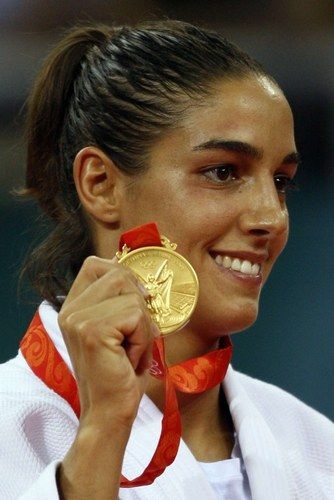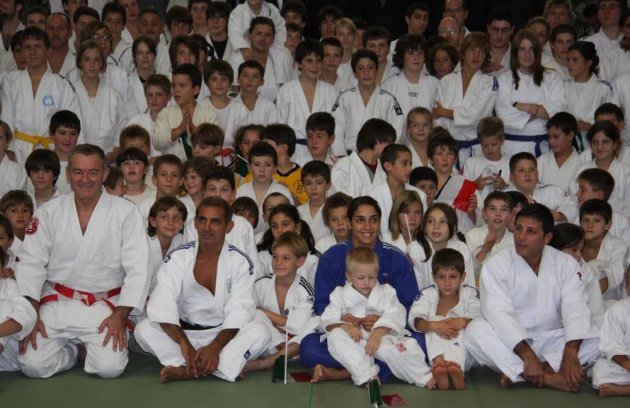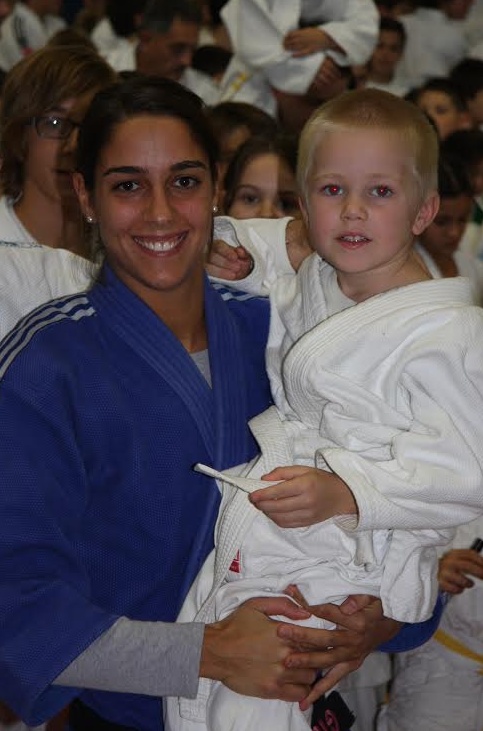Giulia Quintavalle is an Italian judoka. She won the gold medal in the -57 kg weight class at the 2008 Summer Olympics in Beijing.

WA: Can you briefly tell us about yourself and your background?
GQ: I was born in Livorno on the 6th of July 1983 and grew up in Rosignano Solvay. This is where I first started practicing Judo when I was five years old, though I was also involved in other sports including basketball, artistic gymnastics and swimming. As my skills improved increasingly in the martial art of Judo, I became so strong that I was winning tournaments against boys. I found this progress very rewarding and encouraging for myself. When I was 16 years old I left my home town to move to Rome in order to begin training for the career of a professional Judo player within the National team. In 2002 I was enrolled in the Sports team of the Guardia di Finanza (military), which for me was a great personal achievement, as I was the first woman ever to achieve this. My career continued with excellent results, leading to my winning the 5th place at the World Championships in Rio de Janeiro in 2007. This gave me the qualification to enter the 2008 Olympic Games in Beijing, where my ultimate dream came true - winning the gold medal. After the Olympics I continued my career with important results and again qualified for the London Olympic Games in 2012, where I won the 5th place. Now my aim is to participate in the 2016 Olympic Games in Rio de Janeiro.
WA: What inspired you to pursue Judo as a martial art? Tell us about your sports and practice philosophy?
GQ: I first started Judo when I was young and saw it more as a game. But with time I realized how much I gained from it, not only great results, but also the opportunity to travel, to meet new people and cultures across the whole world. These include some things that I liked a lot but also some I enjoyed less. I consider myself to be very fortunate, as having done this from a very young age has enriched my personality. I see my sport as a philosophy of life, which can teach you to appreciate what you do and have and that not everybody has the opportunity to actively participate in a sport. Coming back to Judo, which is a combat sport Judo requires a lot of intense training, dedication and most of all the desire to aim for distant goals and become the best. At the basis of all the training I found respect one of the most fundamental principles.

WA: You won the gold medal in the 57kg weight class at the 2008 Summer Olympics in Beijing. What motivates you to be a female lead in this sport, which is mainly male dominated?
GQ: In Beijing I was the first woman from Italy to win a gold medal in Judo at the Olympic Games, which showed that women can also fight and win. And I find it important that women take this as an example to understand that they can get further and reach their goals. I think that women have a lot to say and give in this world and personally I am very happy when I see other women who stand out and achieve great results. They can be an example to others, who may not have the ability to truly express and show who they are.

WA: How do you see sports not only as a physical practice but an educational tool to empower women?
GQ: An athlete is not just born with the necessary skills but needs lots of discipline and training, which can take a short or a long time. But it is important to make the most of it in order to gain the greatest experience. This sport has taught me many things, involving a lot of hard work, moments of intense physical exercise, and waiting for the right moment. All this has educated me, teaching me humility, respect and tolerance, all valuable principles which today help me in personal and professional life.
Fereshteh Forough - Film Annex Senior Editor
Please visit my personal page on Film Annex and subscribe. Please also visit Women's Annex and subscribe to it for updates, articles and videos.



